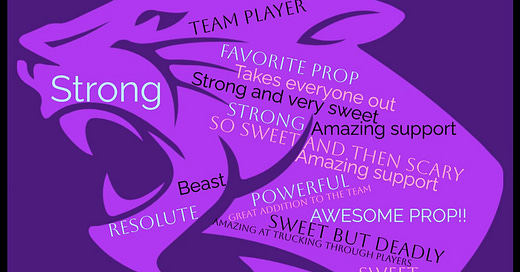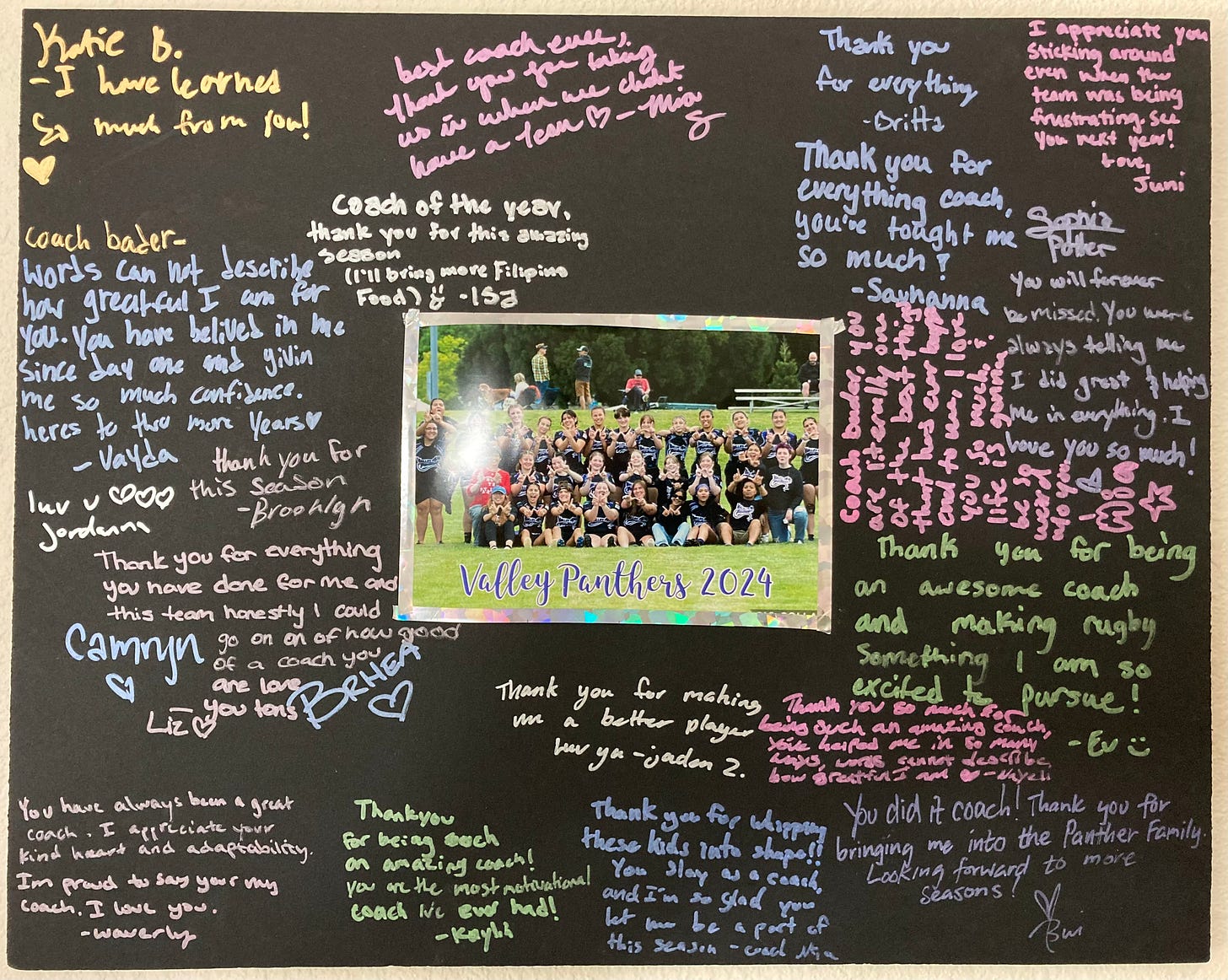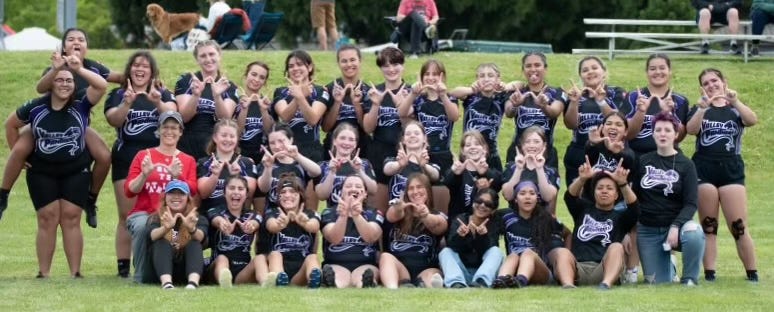Rugby season is over: Tackle pads are in the garage, seniors have graduated, the latest team photo is up on the wall with the others.
My first year as head coach was exhausting. Planning practice felt like I was putting on a TED talk, a wedding, and a conference twice a week. (It must get easier?) The admin was copious; as you know, sometimes it’s harder to delegate than to do. (Should I send a parent the link to order new shorts or just click on the darn link myself?)
I’d estimate my time breakdown as 20% rugby, 30% admin, and 274% figuring out how to work with high school girls. I learned not to put a period at the end of my text messages (“It sounds aggressive, Coach”); and to add a few minutes into my practice plans for counting off into groups of [three, four, six, whatever]. I regularly got texts from players on my way to practice telling me they had to skip that day (when I had naïvely planned a practice for a full team), or on my way to games asking where the game is. A friend who coaches a college team guest-coached one of our practices—and offered to buy me many drinks afterwards. Highschoolers are a different breed…
…and I love them to pieces. Here are a few things I’ve learned this season:
Being held accountable is a gift. As teen psychologist Dr. Lisa Damour told NPR:
Teenagers are heat-seeking missiles for dishonesty. They can smell it or detect it at a hundred yards. And I think there is something about the rigor with which they engage the world and their high expectations for the adults around them that I find incredibly compelling, both intellectually but also in terms of my own personal development. I sort of feel like if you can get it right with a teenager, you're probably getting it right.
I definitely did not always get it right. But it is a gift, being held to that standard of authenticity: having to quickly own when something isn’t working (like a drill that looked great on YouTube when a New Zealand women’s team ran it), or when I don’t know something, or when I’m stressed out and have to articulate why. Not a bad way to be in other parts of life too.
Social media + tech are truly awful. It is possible that the greatest gift I give my players, besides the physical empowerment of a full-contact sport and the emotional empowerment of being part of a team, is two-hour blocks of time without their phones. Jonathan Haidt’s The Anxious Generation is a must-read about the destructive effects of social media and cellphones on tweens and teens, and how the tools promoted to foster connection and happiness are instead fomenting isolation and depression.
At one practice, we were comparing screen time and I had two hours on my phone so far that day, which I thought was a lot. But one of my players had seven hours—at 4pm on a school day—and she wasn’t an outlier. Our district is looking to strengthen its phone-free schools policy (or at least resume enforcement, which went out the window during COVID), which I would be fully in support of.
One-on-one connections break down barriers... After some sub-optimal team dynamics last spring, I was hellbent on figuring out how to strengthen our culture and create one positive, unified team out of the six high schools we drew from. I spent an inordinate amount of practice time facilitating speed-friending: make one big circle, count off 1-2-1-2, 1s step in and turn around, spend 30 seconds talking about your favorite food/song/book/teacher, 1s slide over to the next person. Dare I say it worked?
…and not just between players. I found one of the hardest parts of coaching to be that I rarely got to speak with players individually. One of our parents ran optional Monday conditioning practices, so instead of taking the day off to be with my own kids (God forbid), I came and pulled players for 1:1 walks around the field. It really helped me get to know and support each player (at least the ones who came on Mondays) and therefore the team as a whole, so it’s something I’ll keep making space for.
I might be their favorite grownup, despite signs to the contrary. There were times when I felt like some players didn’t like me. Now, I’m not coaching to make friends with my players. But I am human, so I don’t like feeling disliked; and I couldn’t help but ponder whether I did something to turn them against me. Was it something I could fix? Was it something I needed to fix? (And yes, it was generally players who couldn’t come on Mondays.)
But then again, maybe it wasn’t anything at all. I’m a safe person to act out against; it would take a lot for me to kick someone off the team, or even to bench them. Thankfully, since rugby isn’t a school sport, I don’t have to care if they get bad grades or get suspended. In fact, I want rugby to be the one place they can come when everything else is going south.
And as one friend pointed out: Who knows what they’re going through, and how they behave towards everyone else? Maybe you are, actually, their favorite grownup?
Again back to Damour, who likens the adult’s role to that of a swimming pool wall: Teens like to swim, but when they flounder they want to come hold onto the wall. Then, when they regain confidence, they get embarrassed that they’re on the wall, and push off HARD. The emotional whiplash is difficult for us walls, but being that source of stability, at whatever distance they want at any given moment, is how we support their development.
Being seen is a gift. There’s nowhere to hide on a rugby team. Over the course of a season, your teammates see you at your best and at your worst. Being seen so clearly, in 3-D, can be deeply uncomfortable at any age. But is a powerful antidote to the isolation that so many teens experience (see social media, above).
At the end of the season, as part of the survey where they vote for MVP, Spirit Award, etc., they had to provide a word or short phrase for each of their teammates, which we put into word clouds and handed out at the banquet.
I also had two Linfield student photographers take amazing portraits of the Panthers, which we dumped into a Google Photos album and made available for free. (Do this yourself! Bust up the school photo monopoly!) For most of them, this was the first professional-style photo they got since those overpriced school photos (and maybe the last?); and they loved the experience and the output. Check out the team Facebook or Instagram feeds to see a few of them, along with the Panthers’ own words about what the team means to them.
I love these Panthers, but can’t continue to coach them alone for much longer; 2-3 weekday afternoons and every Saturday for September-October and March-May is too much to take away from my family. (Thank you, Mr. Bader.) I’m lucky to have a few recent alumni around, but they’re just starting their own lives and careers, and like the parents who’ve occasionally helped, they have varying degrees of other commitments. I won’t abandon the team until I know it’s in good hands, but if any of you have ideas for how I can get support, or just happen to know a rugger who recently moved to Oregon and is aching to coach highschoolers, I’m all ears!
In the meantime, if you want to support the team (and therefore me; I don’t get a cut, but the more I fundraise, the less I have to fundraise), you can donate directly here (all donations tax-deductible if you’re the itemizing type). And I just set up a shop so you can buy Panthers swag (and add a donation there too, though that site will take 3.5% vs. the fundraising page’s 0%). I added a sweet “Ruck the Patriarchy” line of shirts—perfect for election season!
Lightning round:
Most important thing you’ll read this year: My pal Ron Lieber’s retirement manifesto. What’s yours?
Best recent fiction reads: Tomorrow, and Tomorrow, and Tomorrow; Lessons in Chemistry (yes, I’m a little behind)
Best YA (on my daughter’s recommendation): The Town With No Mirrors; The Book Thief
My own writing: I’ve somehow become a freelancer for the U.S. Golf Association’s membership quarterly, Golf Journal, and had a surprisingly good time profiling junior golfers and writing a cover story: 24 Reasons to Love Golf in 2024. (Really!)
Podcasts:
My new fave: Wiser Than Me™ with Julia Louis-Dreyfus. (Carol Burnett!)
Enjoy the local boys’ coach (apparently boys play too) and me trying to explain rugby on the McMinnville Yacht Club. (Tongue-in-cheek. No yachts here.)
My spring Linfield class dropped a second season of The Big Questions for Business. Here’s the trailer!
Now back to my own kids for a proper summer, with some travel to see family and plenty of outdoor time. (And watching Team USA play Rugby Sevens in the Olympics!) Wishing the same for you.






